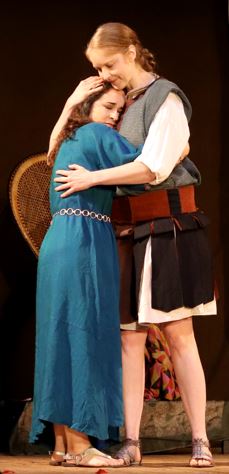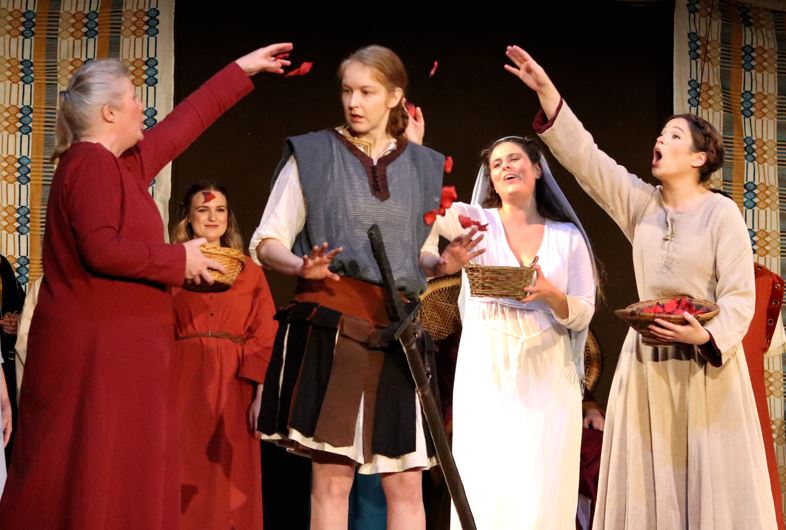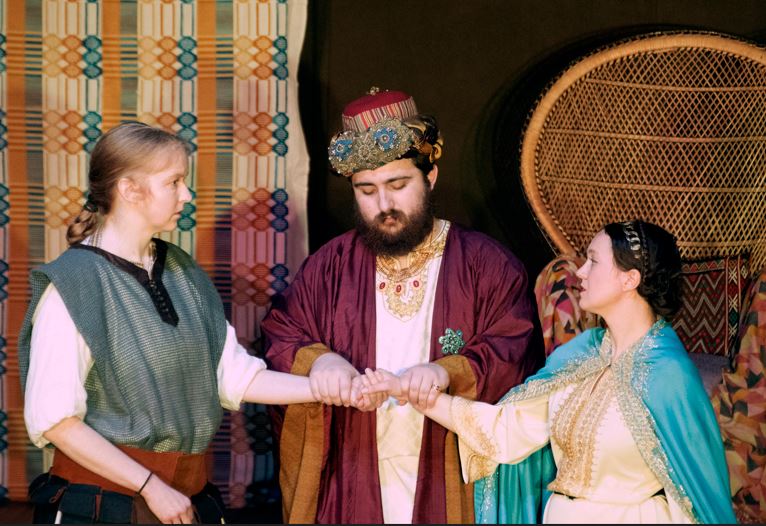Saul
Envy, Eldest Born of Hell
Saul
by George Frideric Handel, libretto by Charles Jennens
Richmond Opera at the Normansfield Theatre, Teddington until 20th November
Review by Heather Moulson
Originally a dramatic oratorio, this piece by Handel was presented as a fully-staged opera. A biblical story taken from the First Book of Samuel, it tells the story of Saul, the king of Israel and his relationship with newcomer David, the slayer of Goliath. There were many layers of emotions to contend with, envy, love, madness, anger. The company portrayed these human issues beautifully.
Sitting in this splendid theatre for the first time is quite an experience in itself, and the striking overture, conducted by musical director Lindsay Bramley, was full of promise. The stage revealed a colourful tableau of Israelites praising the young warrior David for saving them from the tyrant Goliath. A cast of variable ages made very strong and stirring sounds in the epinikion, their ode to victory. The set was basic but striking and there was a good use of the limited space, and the costumes were coordinated and aesthetically pleasing with blues, terracotta and white.
At his magnificent court, King Saul tried and failed dismally to smother his insecurity about the hero David. Played by alto, Amelie Saintonge, David was suitably unmoved by such splendour, against the backdrop of Saul’s son Jonathan, played with conviction by tenor Hugh Benson, who swore devotion to David. This only added fuel to the fire, as Merab, the eldest daughter, offered to the young warrior for marriage by Saul, was disdainful about their unequal social standing. This was irrelevant to the younger daughter, Michal who was deeply in love with the young shepherd. The two sopranos played by Erin Holmes and Patricia Gomez, sang with strong emotions. However, there were fleeting moments when David seemed to stand there like a lemon, but Saintonge came into her own, particularly in confrontation with an Amalekite in Act Three. Taking revenge on the one who dealt the fatal blow to Saul, Hazel McCulloch suitably matched David as his adversary in this memorable scene.
Against such adulation for this humble boy, Saul was unable to control his anger and ordered Johnathan to kill David, who in turn pleaded for David to be spared. Saul then promised younger daughter, Michal to be David’s bride, struggling with his inner turmoil. Saul’s descent into madness unravelled to the point of attacking his oldest son. We were taken to an impressive feast as Saul fell deeper into becoming unhinged.
After the interval, we had the much shorter Act Three and we opened up again to a darker tableau this time with the Israelites’ backs to the audience. They disperse to reveal Saul, played impressively by baritone Oliver Bowes, at a very low ebb indeed.
The King, incognito, sought the Witch of Endor, played by vibrant soprano Dawn Rolt, who had a very strong presence and haunting quality to her voice. I noted how moody and atmospheric the lighting was at this point, a bold red that created the atmosphere, not to mention the sensitive backlighting all the way through. At Saul’s request, the spirit of his late mentor, Samuel was summoned. Played by the bass John Rolt, he cut a bold figure with terrific stage presence. His prophesy that the Israelites would be defeated in the next day’s battle was equally striking. Cleverly interpreted by the orchestra as a symphonic interlude, the Battle of Gilboa claimed Saul and his sons amongst the casualties.
A haunting scene became the climax with a requiem that was mournful yet optimistic with David succeeding to King, and his pledge to marry Michal. The stirring last chorus of the Israelites, “Gird on thy sword, thou man of might” brought loss around to triumph beautifully.
The trios were beautifully sung by Catriona Murray, Claire Doran and Carolyn Burnley. The stunning number of airs and musical numbers are too numerous to mention, but they were skilfully conveyed and stirred emotion in us all. I will however mention the iconic Dead March in C major at the end of Act Three, which was very moving indeed.
Richmond Opera took on a weighty project with this lengthy opera, and director Louise Bakker used this biblical material with great skill. Lighting was very sensitively designed by Simon Pike, and the set and costume design were immaculate. Saul is a production one won’t forget.
Heather Moulson, November 2022
Photography by Jonathan Pritchard and David Dearlove





I so enjoyed reading this review of Saul. In addition to bringing out the tensions between main characters, it highlights the overall success of the production. Wish I’d seen it.
A thoroughly enjoyable performance both as watching and playing Trombone in the orchestra!
Well Done everyone!